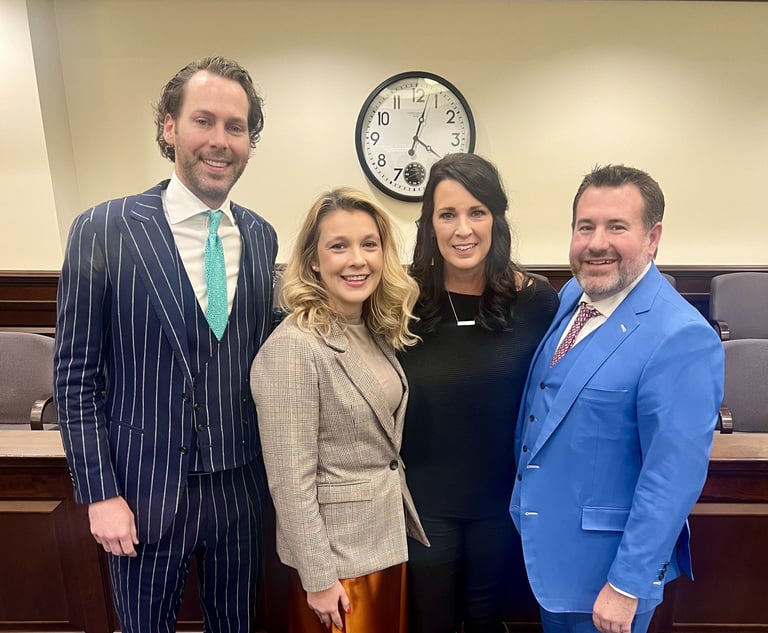Judge Invalidates Regular-Use Exclusion Based on 'Seismic' Pa. Supreme Court Decision
According to attorneys, the decision marks the first time a state court judge has extended the holding in Gallagher to a regular use exclusion, and creates some tension with at least one federal court in Pennsylvania.
July 02, 2020 at 03:25 PM
4 minute read
 Photo: Shutterstock
Photo: Shutterstock
Relying on reasoning underpinning a high-profile Pennsylvania Supreme Court decision from last year, a judge in northeastern Pennsylvania has invalidated an insurance policy's regular use exclusion.
Northampton County Court of Common Pleas Judge Stephen Baratta late last month determined that Erie Insurance Exchange's policy barring coverage for injuries that occurred in vehicles the insured regularly used but did not own went against the Supreme Court's rationale in Gallagher v. Geico, which restricted insurance companies from using the household exclusion to decline stacking coverage. At the time some insurance litigators said Gallagher would have "seismic" impacts on the insurance industry.
According to attorneys, the case, Rush v. Erie Insurance Exchange, marks the first time a state court judge has extended the holding in Gallagher to a regular use exclusion, and creates some tension with at least one federal court in Pennsylvania, which last year rejected arguments that the case applied to regular use exclusion.
In arguing that the regular use policy should be allowed to bar recovery, Erie had cited Barnhart v. Travelers Home and Marine Insurance, a decision out of the U.S. District Court for the Western District of Pennsylvania, which said the reasoning in Gallagher was limited to stacking waivers and did not address underinsured motorist coverage waivers for regular use. Baratta, however, said the Supreme Court's rationale was more broad and came down to whether the waiver violated the Motor Vehicle Financial Responsibility Law.
"The Pennsylvania Supreme Court has recently held on two separate occasions that an insurer cannot use insurance policy language to sidestep the MVFRL's requirement, regardless of whether those requirements are substantive (the household exclusion—Gallagher) or procedural (submitting to an [independent medical exam] at the whim of the insurer—Sayles [v. Allstate])," Baratta said.
Plaintiffs counsel Mark Altemose of Cohen, Feeley, Altemose & Rambo said the the case was significant in extending the reasoning behind Gallagher to the regular use exclusion, and should provide weighty case law to push back against insurance company's arguments that Gallagher is a more limited decision.
"Judge Baratta clearly recognized that Gallagher changed things," he said. "The judge did an excellent job in understanding Gallagher's impact."
He said he is anticipating Erie to appeal the decision.
Co-counsel with Altemose was Scott Cooper of Schmidt Kramer and Jim Haggerty of Haggerty, Goldberg, Schleifer & Kupersmith. In an emailed statement, Cooper said, "This is another decision which is giving the injured victim the coverage which was paid for and enforces clearly worded Pennsylvania law."
Counsel for Erie, Scott Tredwell of McCormick & Priore, did not return a call seeking comment.
According to Baratta, the plaintiff, Matthew Rush, was a police officer for the city of Easton. In November 2015, he was involved in a three-car accident that was allegedly the fault of the two other drivers. Rush was driving a city-owned police vehicle at the time.
According to Baratta, Rush settled with the two other drivers and then recovered the limits of the city's underinsured motorist benefits. Afterward he sought to recover on the UIM coverage provided by his own policy with Erie.
Baratta said that Rush had two vehicle policies with Erie—a personal policy and a commercial policy. The personal policy insured him and his wife up to $250,000 for one vehicle, and the commercial provided $250,000 per person stacked coverage for two vehicles. The Rushes never signed any UIM waivers, however, Erie denied UIM coverage under their regular use exclusion, which disclaimed coverage for injuries arising from accidents involving vehicles they regularly used, but didn't own.
Although the defendants argued that Gallagher was distinguishable from the case for several reasons, including the fact that it involved a motorcycle and the insured selected and paid for stacking on both policies, Baratta said the Supreme Court's reasoning would still apply.
"If the exclusion, as written, is unenforceable as a matter of law, then it does not matter how one tries to distinguish or explain away the facts," Baratta said. "Clearly, logic dictates that if Geico's household exclusion violates the language of the MVFRL, then so does Erie's regular use."
READ THE OPINION:
This content has been archived. It is available through our partners, LexisNexis® and Bloomberg Law.
To view this content, please continue to their sites.
Not a Lexis Subscriber?
Subscribe Now
Not a Bloomberg Law Subscriber?
Subscribe Now
NOT FOR REPRINT
© 2025 ALM Global, LLC, All Rights Reserved. Request academic re-use from www.copyright.com. All other uses, submit a request to [email protected]. For more information visit Asset & Logo Licensing.
You Might Like
View All
Philadelphia Eagles 0-2 in Attempts to Recover Insurance on COVID-Related Losses
4 minute read
High Verdicts and Venue Rule Land Pa. Courts on Top of 'Judicial Hellhole' List
5 minute read

Judge Approves $667K Settlement Against Independence Blue Cross for Unpaid, Pre-Shift Computer Work
4 minute readLaw Firms Mentioned
Trending Stories
Who Got The Work
J. Brugh Lower of Gibbons has entered an appearance for industrial equipment supplier Devco Corporation in a pending trademark infringement lawsuit. The suit, accusing the defendant of selling knock-off Graco products, was filed Dec. 18 in New Jersey District Court by Rivkin Radler on behalf of Graco Inc. and Graco Minnesota. The case, assigned to U.S. District Judge Zahid N. Quraishi, is 3:24-cv-11294, Graco Inc. et al v. Devco Corporation.
Who Got The Work
Rebecca Maller-Stein and Kent A. Yalowitz of Arnold & Porter Kaye Scholer have entered their appearances for Hanaco Venture Capital and its executives, Lior Prosor and David Frankel, in a pending securities lawsuit. The action, filed on Dec. 24 in New York Southern District Court by Zell, Aron & Co. on behalf of Goldeneye Advisors, accuses the defendants of negligently and fraudulently managing the plaintiff's $1 million investment. The case, assigned to U.S. District Judge Vernon S. Broderick, is 1:24-cv-09918, Goldeneye Advisors, LLC v. Hanaco Venture Capital, Ltd. et al.
Who Got The Work
Attorneys from A&O Shearman has stepped in as defense counsel for Toronto-Dominion Bank and other defendants in a pending securities class action. The suit, filed Dec. 11 in New York Southern District Court by Bleichmar Fonti & Auld, accuses the defendants of concealing the bank's 'pervasive' deficiencies in regards to its compliance with the Bank Secrecy Act and the quality of its anti-money laundering controls. The case, assigned to U.S. District Judge Arun Subramanian, is 1:24-cv-09445, Gonzalez v. The Toronto-Dominion Bank et al.
Who Got The Work
Crown Castle International, a Pennsylvania company providing shared communications infrastructure, has turned to Luke D. Wolf of Gordon Rees Scully Mansukhani to fend off a pending breach-of-contract lawsuit. The court action, filed Nov. 25 in Michigan Eastern District Court by Hooper Hathaway PC on behalf of The Town Residences LLC, accuses Crown Castle of failing to transfer approximately $30,000 in utility payments from T-Mobile in breach of a roof-top lease and assignment agreement. The case, assigned to U.S. District Judge Susan K. Declercq, is 2:24-cv-13131, The Town Residences LLC v. T-Mobile US, Inc. et al.
Who Got The Work
Wilfred P. Coronato and Daniel M. Schwartz of McCarter & English have stepped in as defense counsel to Electrolux Home Products Inc. in a pending product liability lawsuit. The court action, filed Nov. 26 in New York Eastern District Court by Poulos Lopiccolo PC and Nagel Rice LLP on behalf of David Stern, alleges that the defendant's refrigerators’ drawers and shelving repeatedly break and fall apart within months after purchase. The case, assigned to U.S. District Judge Joan M. Azrack, is 2:24-cv-08204, Stern v. Electrolux Home Products, Inc.
Featured Firms
Law Offices of Gary Martin Hays & Associates, P.C.
(470) 294-1674
Law Offices of Mark E. Salomone
(857) 444-6468
Smith & Hassler
(713) 739-1250





